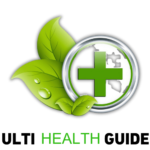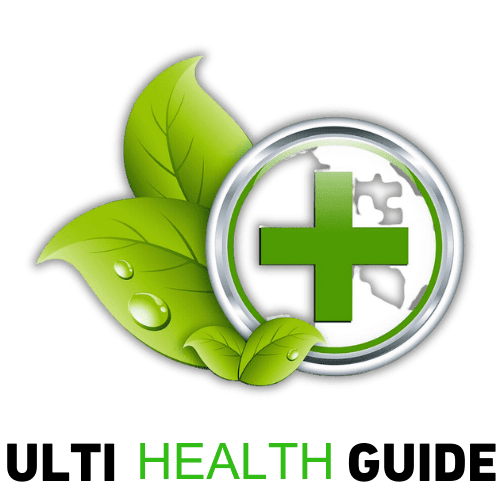What Are Vitamins?
Vitamins are essential organic compounds that are required by the body to perform a variety of biochemical functions. There are thirteen essential vitamins, which can be divided into two categories: water soluble vitamins (vitamins B and C) and fat soluble vitamins (vitamins A, D, E, and K).
Classification Of Vitamins
- Fat-Soluble Vitamins
- Water-Soluble Vitamins
Vitamin A – K
- Vitamin A [river fatty fish; tuna, herring, milk and cheeses eggs, spinach, broccoli, turnip, greens mango, apricot, cantaloupe, squash, sweet potatoes, pumpkin, red peppers, and carrots]
- Vitamin B1 [lean pork chops, salmon, flax seeds, navy beans, green peas, tofu, acorn squash]
- Vitamin B3 [chicken, beef, tuna, salmon, milk, eggs, apples, leafy greens, vegetables, broccoli, kiwi, nuts, and seeds]
- Vitamin B5 [meat, grains, legumes, vegetables, fish, and Brewer's Yeast]
- Vitamin B6 [chickpeas, beef liver, bananas, squash, and nuts]
- Vitamin B7 [egg yolks, liver, broccoli, spinach, avocado, strawberries, and cheese]
- Vitamin B9 [leafy green vegetables, peas, legumes, liver, fortified grain products, and sunflower seeds]
- Vitamin B12 [beef, pork, ham, poultry, lamb, fish, especially haddock and tuna, dairy products, such as milk, cheese, and yogurt, some nutritional yeast products]
- Vitamin D [fatty fish, such as salmon, mackerel, and tuna, egg yolks, cheese, beef liver, mushrooms, fortified milk, fortified cereals, and juices]
- Vitamin E [wheat germ, kiwis, almonds, eggs, nuts, leafy dark green vegetables, and vegetable oils]
- Vitamin K [menanoquines, or K2, include meat, dairy products, eggs, and Japanese “natto"]
Vitamins are a crucial part of our diet. In this blog post, we will be discussing the 13 essential vitamins your body needs. What they are, where you can find them and how they work in your body. Vitamins are critical to the growth and development of healthy cells. They help regulate metabolism, support immunity, and promote a healthy lifestyle. Vitamins are organic substances, which means they’re made by plants or animals.
What are vitamins?
Vitamins are essential nutrients that help us grow, heal, and defend ourselves. Without enough vitamins or minerals in your diet, you may experience conditions like anemia (lack of red blood cells), brittle nails, or insomnia, leading to more severe health issues if left unchecked and untreated.
A healthy lifestyle includes eating a wide variety of foods daily with lots of dietary fiber, such as whole-grain bread, -rice, and fruit. Fiber is essential for gut health (small & big intestines), absorbing nutrients like vitamins and minerals.
Classification of vitamins
Vitamins come in two types: water-soluble vitamins and fat-soluble vitamins, depending on their solubility. Our bodies quickly absorb water-soluble vitamins, which dissolve quickly.
Many fat-soluble vitamins travel through the body through proteins acting as carriers. Food containing fat-soluble vitamins is ingested. The food is then digested by stomach acid and travels to the small intestine, where it is further digested. To absorb fat-soluble vitamins, bile is needed.
Fat-soluble vitamins
There are four fat-soluble vitamins found in the human body. Vitamins A, D, E, and K. They are soluble in organic solvents like fats, allowing them to be absorbed and transported precisely how you would imagine – through your system as if they were part of natural oil.
Fat-soluble vitamins have a greasy, waxy texture. Fat-soluble vitamins can be absorbed through your skin or ingested with food when combined with other nutrients.
Suppose you do not take enough fat-soluble vitamins. In that case, it can lead to night blindness (one of the clinical signs of vitamin A deficiency), osteomalacia (which is caused by insufficient Vitamin D & calcium), coagulation problems (better known as blood clotting) in which Vitamin K1 & K2 play an essential role and nerve and muscle damage and a weakened immune system caused by insufficient vitamin E.
Two main kinds of vitamin K. Vitamin K1 (phylloquinone) come from plants, especially leafy green vegetables like spinach and kale. Vitamin K2 (menaquinone) is naturally created in the intestinal tract and works similarly to K1.
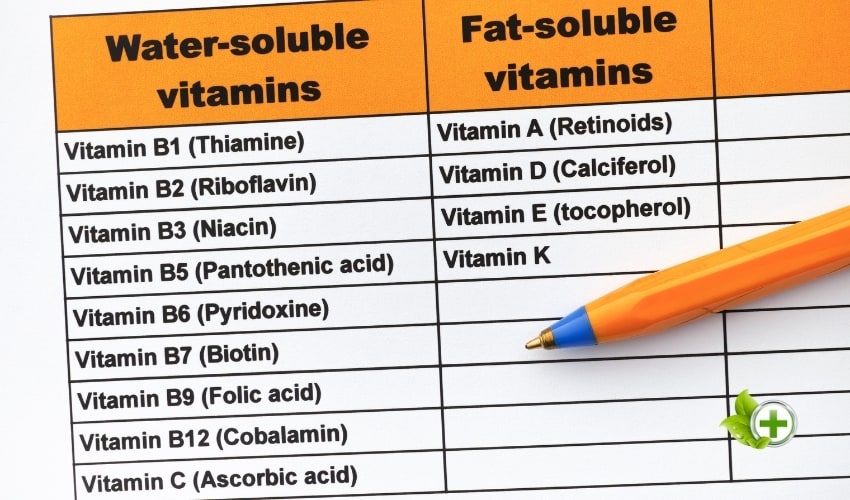
Water-soluble vitamins
There are nine water-soluble vitamins found in the human diet. Vitamin B1, B2, B3, B5, B6, B7, B9, B12 and vitamin C.
The body does not store water-soluble vitamins. This is because water-soluble vitamins will quickly break down into other elements when exposed outside of cells, making them unstable and unable to hold onto any extra molecules. Water-soluble vitamins are excreted through urine or feces when our bodies do not need them; thus, they do not build up in our bodies.
Many people think that taking extra water-soluble vitamins is a waste of money because they will be flushed away with urine, but this is not true! These nutrients help keep our bodies functioning correctly and may even prevent certain diseases by giving us more healthy red blood cells or immunity components called immunoglobulin G (IgG).

Vitamin A – K
There are currently 13 recognized vitamins; below, you will learn more about them.
Vitamin A
Vitamin A is a fat-soluble vitamin essential for our body’s growth and development. Vitamin A’s chemical names are retinol, retinal, and the four carotenoids; alpha-carotene, beta-carotene, and beta-cryptoxanthin.
Vitamin A function
Vitamin A is a nutrient that helps the body’s organs work properly, especially in eyesight and reproduction. It also supports immune function and cell recognition for the healthy functioning of every part of our body, from our hearts all the way down!
Vitamin A deficiency
Night blindness and keratomalacia are rare but severe eye conditions caused by vitamin A deficiency. Night blindness prevents one from seeing in the dark, and keratomalacia causes the transparent front layer of your eyesight (the cornea) to become dewy or cloudy. We highly recommend these Vitamin A supplements if you’re struggling with vitamin A deficiency.
Good sources of vitamin A
There are various forms of vitamin A, and each state comes from a different source.
Retinol is the main form of vitamin A in the blood. Retinol only comes from animal products such as:
- liver
- fatty fish; tuna, herring,
- milk and certain cheeses
- eggs
Beta-carotene is a provitamin/precursor of vitamin A. Beta-carotene is found in dark leafy dark green vegetables;
- spinach
- broccoli
- turnip greens
Carotenoids are the antioxidant form of beta-carotene found in plant foods. Beta-carotene can be turned into retinol when the body needs it. A carotenoid is a dark orange pigment that contributes to the color of some fruits and vegetables. Fruits and vegetables rich in carotenoids are:
- mango
- apricot
- cantaloupe
- squash
- sweet potatoes
- pumpkin
- red peppers
- carrots
Fun Facts: Red bell pepper can be eaten raw, roasted, fried, dried, and powdered. They are a healthy addition to meals, but for more red fruits, we suggest reading 30 Delicious Red Fruits And Vegetables: Nutrition And Health Benefits.

Vitamin B1
Vitamin B1, also known as Thiamine, is an essential nutrient for the body to use carbohydrates as fuel. It helps with glucose metabolism and plays a key role during nerve, muscle & heart function!
Vitamin B1, along with all the B-complex vitamins, are water-soluble vitamins.
Vitamin B1 function
Vitamin B1 is essential for producing several enzymes that break down blood sugar. This vitamin turns carbohydrates, protein, and fats into energy.
B vitamins are necessary for keeping the liver, eyes, and skin healthy.
Vitamin B1 deficiency
Vitamin B1 deficiency is a condition that can lead to beriberi, characterized by problems with peripheral nerves and wasting. Alongside weight loss or anorexia, mental issues like confusion and short-term memory loss may exist. Individuals even develop muscle weakness which progresses into cardiovascular complications such as high blood pressure (hypertension), heart failure, etc., if left untreated!
Good sources of vitamin B1
The body needs a steady supply of B vitamins to stay healthy, and you can find them in many different places—for example, liver, beef, pork, lentils, salmon, green peas, oats, seeds, nuts, beans, tofu, brown rice, squash, asparagus, and seafood
Top 10 foods high in Vitamin B1;
- lean pork chops
- salmon
- flax seeds
- navy beans
- green peas
- tofu
- acorn squash

Vitamin B2
Vitamin B2, riboflavin, is a vitamin your body needs to break down food components and absorb other nutrients. It also helps maintain tissues, among many other functions!
Vitamin B2 function
Riboflavin is essential because it helps convert carbohydrates into adenosine triphosphate (ATP). The human body produces its ATP from food, and when this compound isn’t enough for energy needs, Riboflavin provides an extra boost!
Vitamin B2 may help prevent cataracts and migraine headaches, but more research is needed to confirm this.
Other studies have found that in children with autism, supplements of vitamins B6 & magnesium reduce the levels of abnormal organic acids within their pee- which could be linked back to blurred vision or other medical issues!
Vitamin B2 deficiency
Vitamin B2 deficiency can be a significant risk when the diet is poor because the human body excretes this vitamin continuously and does not store it. A person who has insufficient Vitamin B2 may also have other vitamin deficiencies.
Symptoms of deficiency include:
- Cracked lips
- Dry skin
- inflammation of the lining of the mouth
- Inflammation of the tongue
- Mouth ulcers
- Red lips
- sore throat
- Scrotal dermatitis
- Fluid in mucous membranes
- Iron-deficiency anemia
People with high alcohol levels are at higher risk of vitamin B2 deficiency.
Good Sources Of Vitamin B2
Vitamin B2 comes from most of our food sources;
- Lima beans, navy beans, and peas
- Molasses
- Mushrooms
- Nuts
- Parsley
- Rosehips
- Sage
- Cruciferous green vegetables, such as broccoli, Brussels sprouts, spinach, dandelion greens, and watercress
- Whole-grain bread and wheat bran
- Fish, meat, and poultry, such as turkey, chicken, beef, kidneys, and liver
- Eggs
- Dairy products
- Fortified cereals

Vitamin B3
The body needs vitamin B3 or niacin to grow and work correctly. When we do not eat enough, our bodies start malfunctioning! There are two main chemical forms of niacin:
- nicotinic acid
- niacinamide (sometimes called nicotinamide)
Both forms are found in foods as well as supplements.
Vitamin B3 function
The critical role of niacin in your body is to synthesize the coenzymes nicotinamide adenine dinucleotide phosphate (NADP) and nicotinamide adenine dinucleotide (NAD), which are involved in plus-minus 400 biochemical reactions. It assists the body in processing components from food into usable energy.
Niacin also plays a role in cell signaling, making and repairing DNA, and acting as an antioxidant.
Vitamin B3 deficiency
Low vitamin B-3 can cause pellagra. When this happens, the body cannot properly absorb nutrients from food. It can be treated with niacinamide supplementation.
Some of the symptoms of niacin deficiency:
- skin rash or discoloration
- bright red tongue
- vomiting
- constipation or diarrhea
- depression
- fatigue
- memory loss
- loss of appetite
Good sources of vitamin B3
Examples of suitable sources include:
- chicken
- beef
- tuna
- salmon
- milk
- eggs
- apples
- leafy green vegetables
- broccoli
- kiwi
- nuts and seeds
- kiwi
- lentils
Vitamin B5
Vitamin B5 is also known as pantothenic acid, and the word “pantou” means everywhere. This vitamin can be found in nearly all foods we eat.
Vitamin B5 function
Vitamin B 5 helps keep healthy skin smooth by helping to make collagen better so that you have fewer wrinkles when they show up on time (and hopefully before!). It also aids hair growth AND prevents common eye problems like dryness or irritation – how cool is that?!
Vitamin B5 deficiency
Pantothenic acid deficiency is very rare as all food contains this vitamin.
Good sources of vitamin B5
Vitamin B5 can be found in almost all food sources; plant sources and animal sources:
- Meat: chicken, duck, pork, beef, liver, and kidney
- Grains: bread, cereals & whole-grain products.
- Legumes: Lentils, split peas, soybeans., yogurt, and milk products
- Dairy products: Egg yolks, milk
- Vegetables: Mushrooms, avocado, broccoli, sweet potatoes, corn, cauliflower, and tomatoes.
- Fish: Salmon, lobster, and shellfish
- Brewer’s Yeast
Vitamin B6
Also known as pyridoxine, vitamin B6 is a water-soluble vitamin that dissolves in the body. The human brain stores only small amounts and releases any excess during digestion or metabolism of food, but individuals still need enough for good health every day.
Vitamin B6 function
Vitamin B6 is essential for healthy brain function and energy production. Some of its roles include helping to create neurotransmitters, such as serotonin or dopamine, turning food into usable energy in cells.
Vitamin B6 is also essential for cell growth and development. It helps the body form red blood cells, which carry oxygen throughout your system!
Vitamin B6 deficiency
Low levels of vitamin B6 may lead to anemia and peripheral neuropathy; the body needs ample amounts for red blood cell production and nerve function, which could become compromised if not replenished regularly with this essential nutrient.
Good sources of vitamin B6
These include:
- chickpeas
- beef liver
- bananas
- squash
- nuts
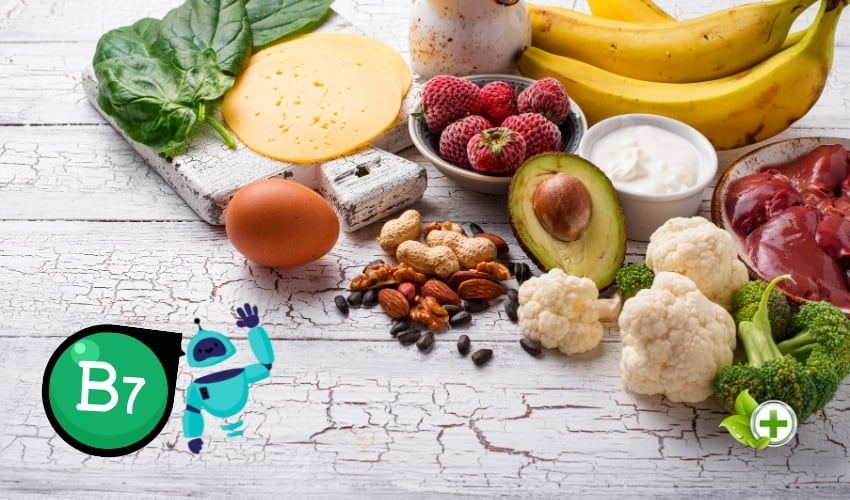
Vitamin B7
Biotin, also known as vitamin H or B7, helps the body metabolize fats and carbohydrates. It’s not stored in our bodies, so we need to take it daily for the best results!
Vitamin B7 function
Vitamin B7 is crucial for metabolism regulation and the function of the nervous system. The nutrient is also essential for healthy hair, skin, and nails. Biotin doesn’t work well in topical form but adding it as a supplement may help boost hair and nail health. Vitamin B7 is an essential vitamin for many functions. It has been found to help metabolize proteins, fats, and carbohydrates and contribute to keratin.
Vitamin B7 has been shown to help with digestive problems such as diarrhea and colitis.
Vitamin B7 deficiency
Biotin is an essential part of enzymes in the body that break down substances like fats, carbohydrates, and others. There isn’t a good test for detecting low biotin levels, so it’s usually identified by its symptoms, which include thinning hair and red scaly rash around the eyes, nose, and mouth.
If you’re experiencing hair thinning or hair loss, biotin may assist in regrowth. Some research suggests that increased biotin intake can improve overall hair quality, including thickness and shine.
Good sources of vitamin B7
Vitamin B 7 is found naturally in many food sources:
- egg yolks
- liver
- broccoli
- spinach
- avocado
- strawberries
- cheese
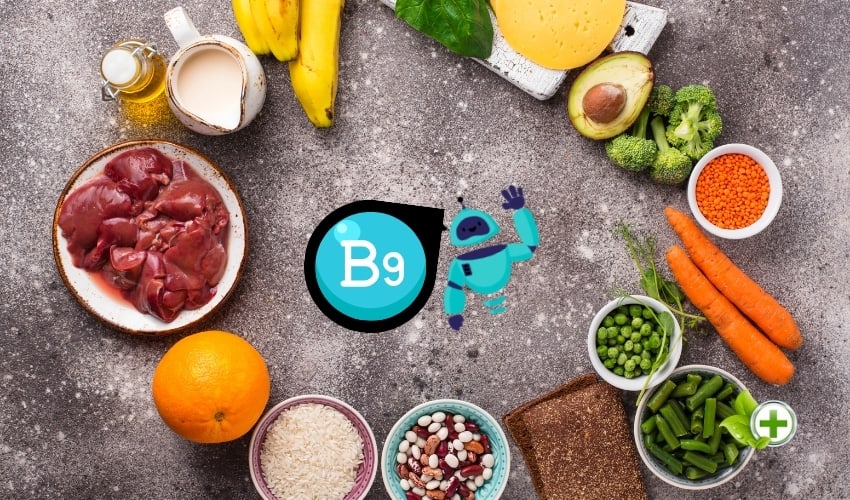
Vitamin B9
Vitamin B9, folate or folic acid is an essential B vitamin necessary for producing red and white blood cells in the bone marrow and DNA and RNA. It can also help turn carbohydrates into energy!
Vitamin B9 function
Folic acid is a B vitamin that women need to have healthy pregnancies. It helps develop your nervous system, enabling you and future children’s brains to function correctly!
Vitamin B9 deficiency
Many women take prenatal vitamins before they become pregnant and throughout their pregnancy to support the development of any resulting baby. A lack of folic acid can cause problems with neural tube formation, which may lead to anencephaly and other birth defects.
Good sources of vitamin B9
Foods rich in folic acid include:
- leafy green vegetables
- peas
- legumes,
- liver
- some fortified grain products
- sunflower seeds.
- Also, several fruits have moderate amounts.

Vitamin B12
Vitamin B12 is also known as cobalamin. It’s a vitamin necessary for the body’s energy production and helps regulate mood, cognitive function, and nerve conduction velocity, among other things!
Vitamin B12 function
The body needs vitamin B12 for the normal function of the brain and nervous system, red blood cell formation, and other critical processes.
Vitamin B12 deficiency
Several symptoms can be caused by low B12 levels, including irreversible damage to the brain and nerves. Fortunately, this issue isn’t all too common, but it does exist!
Good sources of vitamin B12
Vitamin B12 is naturally found in animal products and not in plant products.
Products high in B12 include;
- beef
- pork
- ham
- poultry
- lamb
- fish, especially haddock and tuna
- dairy products, such as milk, cheese, and yogurt
- some nutritional yeast products
- eggs

Vitamin C
Vitamin C, or ascorbic acid, is a vital nutrient for the body. It helps promote healthy skin, bones, and muscles and boosts your immunity to fight off illness!
Vitamin C function
Ascorbic acid is an essential nutrient that helps the body with many tasks, such as strength and healing. It also supports your immune system by fighting off infection while strengthening blood vessels to deliver oxygen more efficiently throughout each cell in our bodies. Vitamin C helps the body absorb iron.
Vitamin C deficiency
Scurvy is a Disease of the Ages
Vitamin C deficiency may result in scurvy, which causes bleeding gums and an inability to heal wounds. Patients with this condition will lose their teeth over time unless they receive treatment soon enough. This will also lead to a weaker immune system.
Good sources of vitamin C
Good sources of vitamin C are found mainly in citrus fruit and other plant sources
Some good sources of vitamin C include:
- red and green peppers
- oranges and orange juice
- grapefruit
- kiwi fruit
- strawberries
- spinach and other green, leafy vegetables
- potatoes
- green peas

Vitamin D
Vitamin D function
Vitamin D, also known as ergocalciferol and cholecalciferol, are fat-soluble vitamins that function as antioxidants and anti-inflammatory agents. It’s also known to promote bone health by boosting calcium absorption in the body and reducing pain associated with osteoporosis or joint symptoms.
Vitamin D deficiency
Not getting enough vitamin D can lead to rickets and osteomalacia (bone softening).
Good sources of vitamin D
Ensuring enough exposure to sunlight is the best way to get all the vitamin D you need, but other sources are nutritious foods, including:
- fatty fish, such as salmon, mackerel, and tuna
- egg yolks
- cheese
- beef liver
- mushrooms
- fortified milk
- fortified cereals and juices
- Cod liver oil (one tablespoon of this nutrient-packed concentrate contains over 100 percent of the recommended allowance of vitamin D.

Vitamin E
It’s essential to have enough vitamin E in your diet, and it can be found naturally or added as a supplement.
Vitamin E function
Tocopherol is the most common form of this powerful nutrient with antioxidant properties that help protect cells from damage caused by free radicals – substances created when oxygen reacts with other elements like fat molecules at low levels of inflammation (as occurs inside our bodies). It also helps maintain healthy skin because its anti-inflammatory components fight acne bacteria without harsh chemicals, so you don’t get side effects like dryness or irritation!
Vitamin E deficiency
Vitamin E deficiency is rare and may cause hemolytic anemia in newborns. The body cells that make up the bloodstream are destroyed by this lack of essential vitamins and minerals, which leads to severe complications for children’s health, such as fits or even death!
Good sources of vitamin E
Good sources of vitamin E include:
- wheat germ
- kiwis,
- almonds,
- eggs,
- nuts,
- leafy dark green vegetables,
- vegetable oils
Interactions
The use of some drugs can affect your vitamin E levels. Possible interactions include:
- Alkylating agents and anti-tumor antibiotics: There’s concern that high doses of vitamin E might affect the use of these chemotherapy drugs.
- Anticoagulants and anti-platelet drugs, herbs, and supplements: Using vitamin E with these drugs, herbs, and accessories to reduce blood clotting might increase the risk of bleeding.
- Cytochrome P450 3A4 (CYP3A4) substrates: Use caution when taking vitamin E and other drugs affected by these enzymes, such as omeprazole (Prilosec, Zegerid).
- Statins and niacin: Taking vitamin E with statins or niacin, which might benefit people with high cholesterol, could reduce niacin’s effect.
- Vitamin K: Taking vitamin E with vitamin K might decrease the effects of vitamin K.
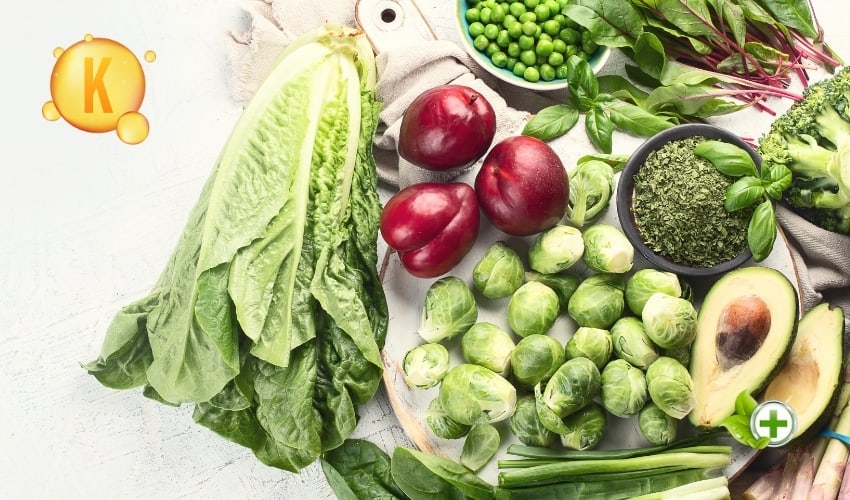
Vitamin K
A vitamin that helps keep your skin healthy, phylloquinone is a powerful antioxidant, and menaquinone can help maintain its elasticity.
Vitamin K function
Without vitamin K, the body cannot produce prothrombin. A clotting factor necessary for blood clotting and bone metabolism means less access to nutrients like calcium in your diet!
Vitamin K deficiency
If you’re low on this vitamin, it may cause an unusual susceptibility to bleed and even develop into something more severe like high fever during infections because there’s not enough anti-coagulant action happening within our bodies when we don’t have enough Vitamin K present!
Good sources of vitamin K
Vitamin K1 occurs in high amounts in leafy green vegetables such as; Kale and Swiss chard. Other sources include vegetable oils and some fruits.
Sources of menanoquines, or K2, include meat, dairy products, eggs, and Japanese “natto,” made from fermented soybeans. Here’s another good source of Vitamin K supplements.
Conclusion
Vitamins are essential nutrients that play various vital roles in the body. Deficiencies can harm health, so it’s necessary to get them from your diet–but if you have specific needs like pregnancy or illness-related dietary restrictions, supplements might be recommended by doctors and health care providers.
Ulti-Block does not provide medical advice, diagnosis, or treatment. Any information published on this website or by this brand is not intended as a substitute for medical advice. You should not take any action before consulting with a healthcare professional.
FAQ
What Does Your Body Do With The Vitamins You Consume?
The body does a variety of things with the vitamins you consume. Some vitamins are water soluble and flush out of the body quickly, while others are stored in the liver or other tissues for later use. Each vitamin has a specific job to do in the body, from keeping our bones healthy to helping us produce energy.
How Can You Tell If You Are Getting Enough Vitamins In Your Diet?
You can tell if you're getting enough vitamins in your diet by looking at your overall health and energy levels. If you're feeling tired and run down, it may be a sign that you're not getting enough vitamins. Another way to tell if you're getting enough vitamins is to look at your blood work. If your vitamin levels are low, your doctor may recommend that you take a vitamin supplement.
